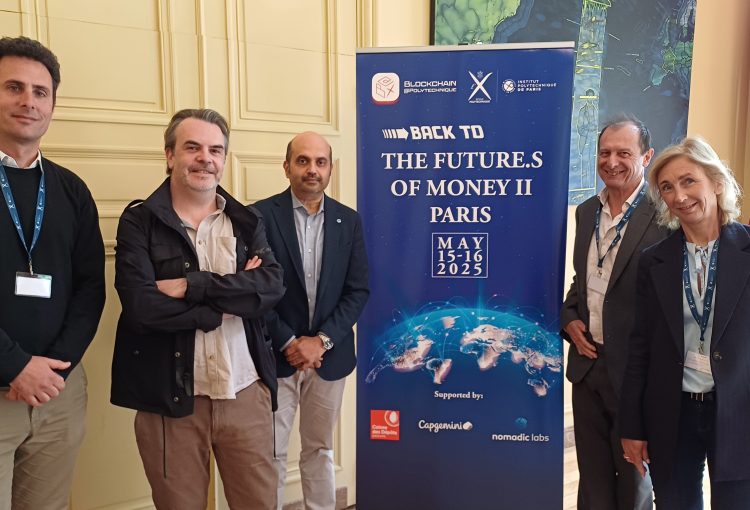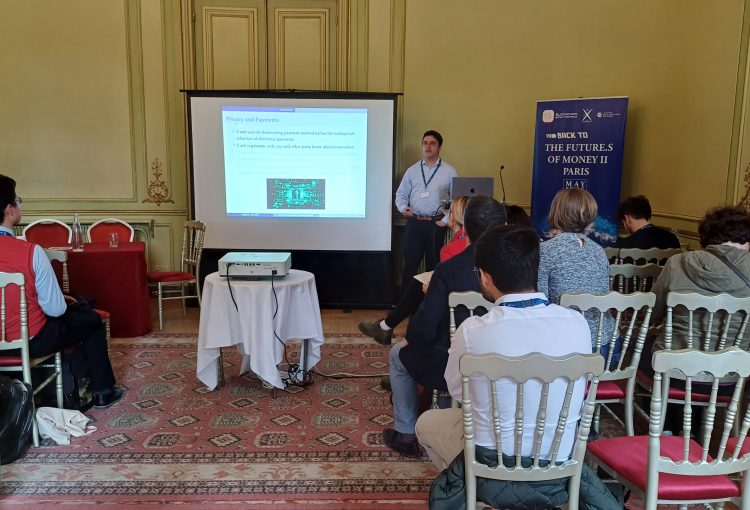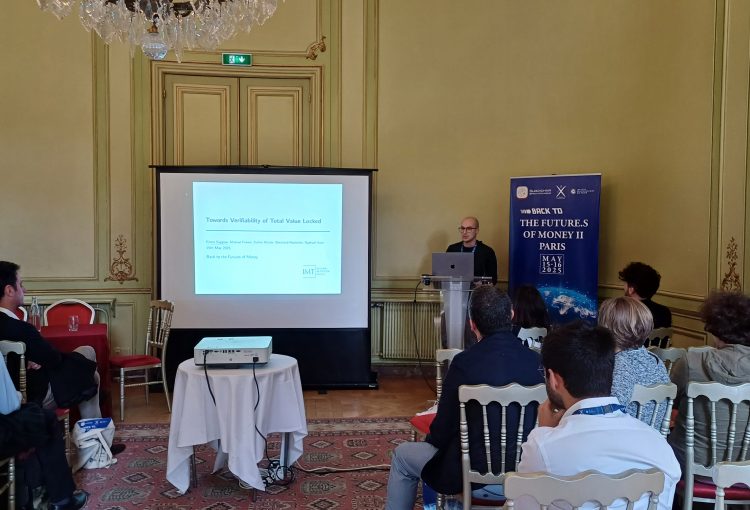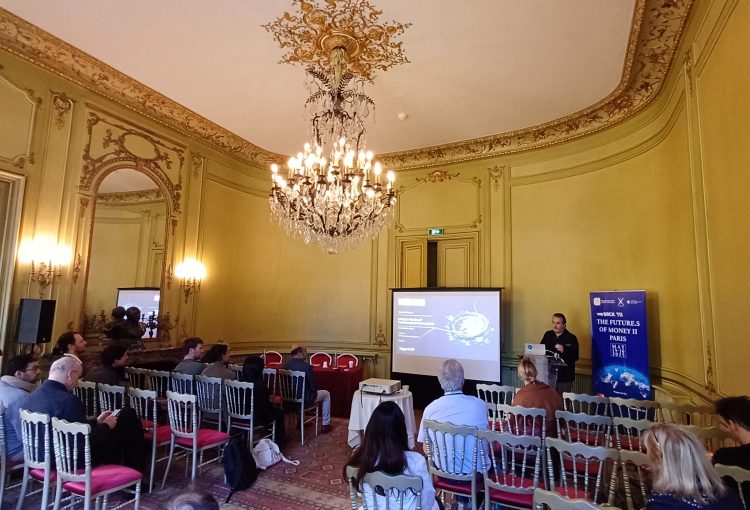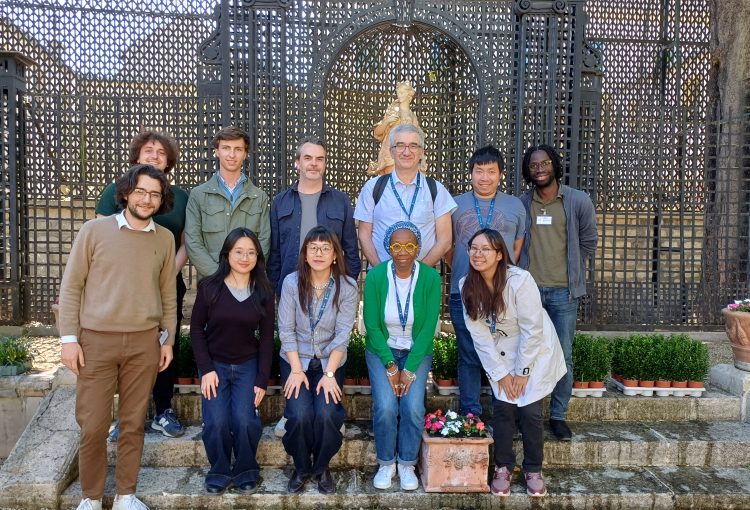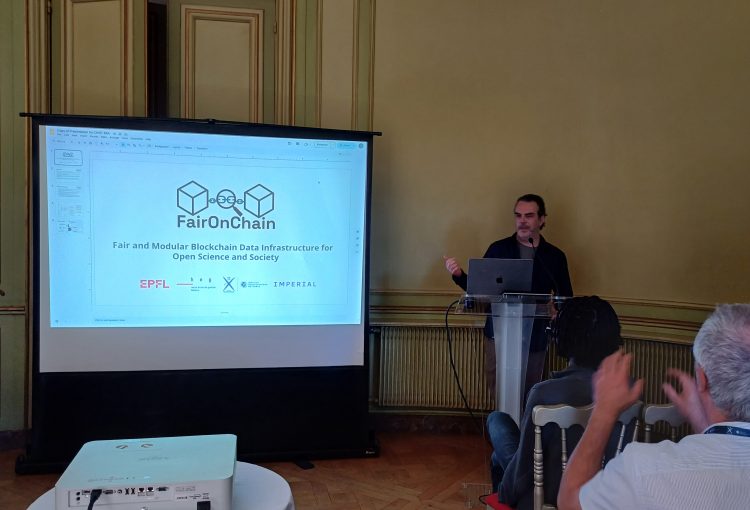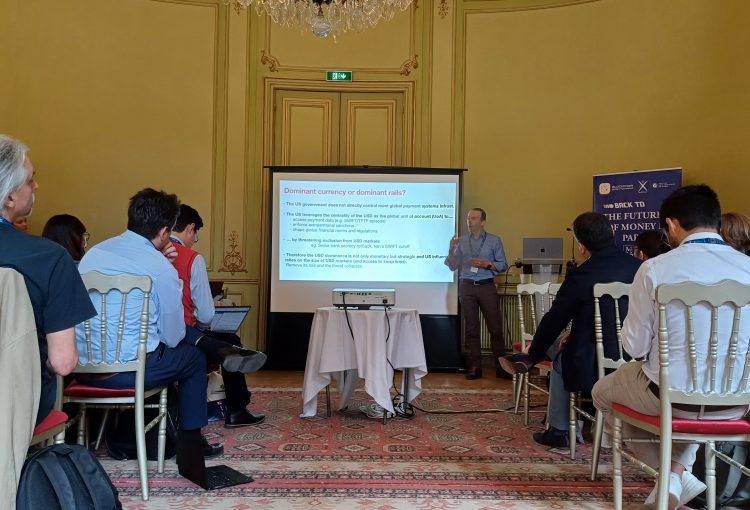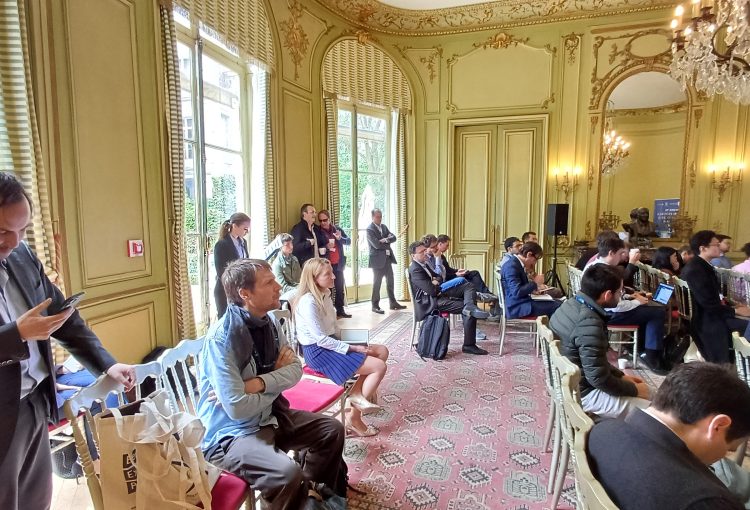VoxEU Column – Part-time work slows the narrowing of France’s lifetime gender earnings gap – Bertrand Garbinti Cecilia García-Peñalosa Vladimir Pecheu Frederique Savignac – 22 Jun 2025
Arnak Dalalyan awarded an ERC Advanced Grant for his work on generative AI models

We are proud to announce that Arnak Dalalyan, director of CREST, Hi! PARIS Fellow and Professor of statistics at ENSAE Paris, has been awarded a European Research Council (ERC) Advanced Grant for his project SAGMOS – Statistical Analysis of Generative Models: Sampling Guarantees and Robustness. This highly competitive grant will support his ambitious research at the intersection of statistics, machine learning, and artificial intelligence.
With this new grant, the CREST now hosts eight ongoing ERC projects: three ERC Starting Grants, three ERC Consolidator Grants, and now two ERC Advanced Grants. This remarkable track record reflects the strength, diversity, and international visibility of fundamental and applied research at the lab. Arnak Dalalyan joins a long line of CREST researchers distinguished by the ERC, following for example the recent ERC Consolidator Grant obtained by Yves Le Yaouanq in economics.
About Arnak Dalalyan
A mathematician and statistician, Arnak Dalalyan studied at Yerevan State University (Armenia) before obtaining a PhD in statistics from Le Mans University in 2001, and an HDR from Sorbonne University (formerly Université Pierre et Marie Curie) in 2007. After postdoctoral research at Humboldt University in Berlin and several academic positions in France, he joined ENSAE Paris and CREST, where he has been director since 2020. His research focuses on mathematical statistics and its applications to machine learning, with particular emphasis on robust methods, high-dimensional data, and sampling techniques.
SAGMOS – Statistical Analysis of Generative Models: Sampling Guarantees and Robustness
Generative models — algorithms capable of creating realistic texts, images, music, or molecular structures — are now at the heart of many technological innovations, from artistic creation to drug discovery. The SAGMOS project will provide new mathematical guarantees on the reliability, originality, and efficiency of such models, particularly diffusion models that have become the new standard in the field.
“In recent years, generative models have made remarkable progress. But we still need to understand how much data is required for these models to generate reliable and truly novel outputs. The SAGMOS project aims to bridge this gap by providing precise theoretical guarantees,” explains Arnak Dalalyan.
The project will lead to the recruitment of PhD students and postdoctoral researchers, and to the organisation of international workshops to disseminate its findings.
The ERC Advanced Grant
The ERC Advanced Grant is one of the most prestigious funding schemes in Europe, supporting established researchers with a track record of significant research achievements. The grant allows recipients to pursue ground-breaking, high-risk projects that can lead to major scientific advances. The funding awarded to Arnak Dalalyan reflects the European commitment to frontier research and the scientific excellence of the CREST research centre.
VoxEU Column – Fiscal sustainability and budgetary inertia: When checks and balances really matter – Facundo Piquillem, Alessandro Riboni – 11 Jun 2025
Impôts et perception : l’expertise du CREST mise à contribution
Le Conseil des prélèvements obligatoires (CPO) vient de publier la note n°11 (juin 2025) présentant les analyses complémentaires de la deuxième édition du Baromètre des prélèvements fiscaux et sociaux. Ce travail inédit repose sur un appareil statistique sophistiqué mêlant données déclaratives et données administratives. Il bénéficie de l’expertise de chercheurs du CREST, fortement mobilisés depuis la première édition de 2021.
Une collaboration au service d’une meilleure compréhension du consentement à l’impôt
Le Baromètre du CPO, mené en partenariat avec Harris Interactive, l’Insee et le CREST, vise à mieux comprendre l’opinion des Français sur les impôts et cotisations sociales. Pour la première fois, les réponses des enquêtés ont été appariées à leurs données fiscales réelles (revenus, taux d’imposition), dans un cadre sécurisé et anonyme via le CASD, le Centre d’accès sécurisé aux données.
Des résultats éclairants sur la perception de l’impôt
L’étude confirme que la satisfaction vis-à-vis de l’usage de l’argent public reste le facteur le plus déterminant de l’acceptation des prélèvements. Elle révèle également que près de la moitié des Français connaissent avec précision leur revenu fiscal et leur taux d’imposition, une donnée souvent sous-estimée dans les enquêtes classiques.
Les travaux mettent aussi en évidence que la surestimation de son propre taux d’imposition est corrélée à une moindre acceptation de l’impôt, alors que les réductions d’impôt pour dons aux associations sont associées à une plus grande adhésion au système fiscal. À l’inverse, les crédits d’impôt pour garde d’enfants ou emploi à domicile semblent, de manière paradoxale, associés à un moindre consentement.
Le CREST, au cœur de la recherche socio-fiscale
Un groupe de chercheurs du CREST a été impliqué dans toutes les étapes du projet, depuis la conception de l’enquête jusqu’à l’analyse des données appariées. Leur contribution témoigne de la capacité du laboratoire à combiner outils empiriques de pointe et enjeux de société, notamment autour des questions de justice fiscale, de perception citoyenne et de politiques publiques.
Cette collaboration confirme l’importance de produire des indicateurs fiables pour nourrir le débat public, et montre que les sciences sociales quantitatives ont un rôle essentiel à jouer dans l’évaluation des politiques fiscales et sociales.
Navigating the Future of Money: Highlights from the Second (Back To) The Futures of Money Workshop
On 15-16 May 2025, Blockchain@X Research Center — an academic chair of École Polytechnique hosted at CREST — held the second edition of (Back To) The Futures of Money workshop, at the Maison de l’Amérique Latine in Paris.
This two-day interdisciplinary event brought together scholars, policymakers, and industry experts to discuss the evolution of monetary systems, blockchain innovation, and the future of decentralized finance (DeFi). The program featured academic presentations, industry talks, roundtable discussions, and informal exchanges during the breaks and lunches.
The first day explored the economic and geopolitical dimensions of cryptocurrencies. It featured academic presentations by Bruno Biais (HEC Paris), Linda Schilling (Olin Business School), and Cyril Monnet (University of Bern), followed by a roundtable discussion on the geopolitics of payment systems, moderated by Christian Pfister (Université d’Orléans).
In the afternoon, Laurent Camus (Banque de France) introduced the current state of stablecoin regulation, setting the stage for a lively panel discussion with representatives from Circle, Société Générale, and Angle Protocol. The day concluded with academic insights on privacy-preserving payment mechanisms from Agostino Capponi (Columbia University) and on verifying total value locked (TVL) in DeFi from Pietro Saggese (IMT Lucca).
The second day shifted focus to technological perspectives on blockchain and DeFi. It opened with a forward-looking keynote on technology convergence by Sudhir Pai (Capgemini), followed by a session on trust frameworks for AI and blockchains featuring Gilles Fedak (iExec) and Jason Delabays (Zama). The academic segment continued with presentations from Hanna Halaburda (NYU Stern) and Christoph Schlegel (Flashbots), addressing mechanism design and Sybil-resistance on maximal extractable value (MEV).
In the afternoon, Fahad Saleh (University of Florida) and Andrea Canidio (CoW Protocol) presented their perspectives on the interactions between blockchain layers and Ethereum’s immutability. The day concluded with talks from Louis Bertucci (Institut Louis Bachelier), Evgeny Lyandres (Tel Aviv University), and Julien Prat (IP Paris) on lending protocols, quantitative investment strategies, and systemic risk in DeFi.
We extend our sincere thanks to all speakers, panelists, and participants who contributed to the success of this workshop. (Back To) The Futures of Money II reaffirmed the need for interdisciplinary collaboration in navigating the rapidly evolving financial landscape shaped by blockchain technology. We look forward to continuing the conversation in future editions.
The Blockchain@X Research Center at École Polytechnique aims to combine academic excellence with institutional and scientific prestige in order to foster innovation in blockchain. A pioneer in its field and financially supported by Capgemini, Nomadic Labs and Caisse des Dépôts, it brings together scientists in computer science and economics whose research focuses on blockchains and related technologies. The chair also offers a wide range of courses to students at École Polytechnique who wish to learn about this constantly evolving field, and contributes to the organization of international academic conferences such as Tokenomics.
Emmanuelle Taugourdeau signe une tribune sur la sous-représentation des femmes dans la recherche économique avec Le Monde
Emmanuelle Taugourdeau, directrice de recherche au CNRS signe une tribune sur la sous-représentation des femmes dans la recherche en économie pour le journal Le Monde.
IPP : Entretien avec Bertrand Garbinti, responsable du pôle fiscalité des ménages
03/06/2025
Bertrand Garbinti , chercheur au CREST-GENES, a pris ses fonctions à l’IPP début janvier 2025, en qualité de responsable du pôle fiscalité des ménages. Près de 6 mois après son arrivée, Bertrand Garbinti revient sur ses motivations et les enjeux associés à la direction de ce pôle « historique » de l’IPP.
Julien Prat pour Polytechnique Insights : Atouts et contraintes de l’euro numérique de la Banque centrale
Paola Tubaro Sheds Light on the Invisible Workforce Behind AI at Buenos Aires’ “Nuit des Idées”
Paola Tubaro, CNRS Research Director at CREST, recently participated in the Nuit des Idées (Night of Ideas) held at the iconic Teatro Colón in Buenos Aires. This international event, organized by the Institut français d’Argentine and its partners, brings together thinkers, artists, and researchers to engage in public discussions on contemporary challenges.
During the event, Tubaro spoke about the often-overlooked human labor behind artificial intelligence systems. She emphasized the critical role of micro-workers who perform essential tasks such as data labeling and content moderation, enabling AI technologies to function effectively. Tubaro highlighted the precarious conditions these workers often face, including low wages, invisibility, and a lack of rights or recognition.
In a follow-up interview with Clarín, one of Argentina’s leading newspapers, she delved deeper into the topic. She described these workers as “neo-laborers of the algorithm,” performing countless “microtasks” for platforms like Amazon Mechanical Turk—often during their free time, with few protections and little public awareness of their role. Tubaro called for greater transparency, fairer conditions, and the ethical recognition of their contribution to technological progress.
Her reflections contribute to a broader understanding of the social and economic infrastructures behind AI systems, urging policymakers and the public to account for the real human costs behind digital automation.
Marion Leroutier dans Le Monde et Libération : quand les inégalités de genre se mesurent aussi en CO₂
Marion Leroutier, chercheuse au CREST et enseignante à l’ENSAE Paris, voit ses travaux récents mis à l’honneur dans Le Monde et Libération. En collaboration avec Ondine Berland (London School of Economics) elle publie une étude inédite sur les différences d’empreinte carbone entre les hommes et les femmes en France.
Le constat est clair : les femmes émettent en moyenne 26 % de CO₂ de moins que les hommes. Ce différentiel provient principalement de deux postes de consommation :
-
La viande rouge, consommée plus fréquemment par les hommes ;
-
La voiture, utilisée de façon plus intensive et souvent pour des trajets plus longs.
Mais ces écarts ne sont pas uniquement liés aux préférences individuelles : les rôles sociaux, les différences biologiques et d’insertion sur le marché du travail y jouent un rôle structurant. L’étude permet ainsi d’éclairer les liens entre choix de consommation, répartition des ressources au sein des ménages, et responsabilité environnementale.
Ces résultats posent des questions cruciales pour la justice climatique et les politiques publiques : comment prendre en compte les inégalités sociales et de genre dans la transition écologique ? Et comment concevoir des mesures efficaces et équitables ?
📰 À lire dans :
Le Monde, Libération, Economie Matin et le Journal de France 2 (minute 25), Le Nouvel Obs, ConsoGlobe, TF1, France Info




